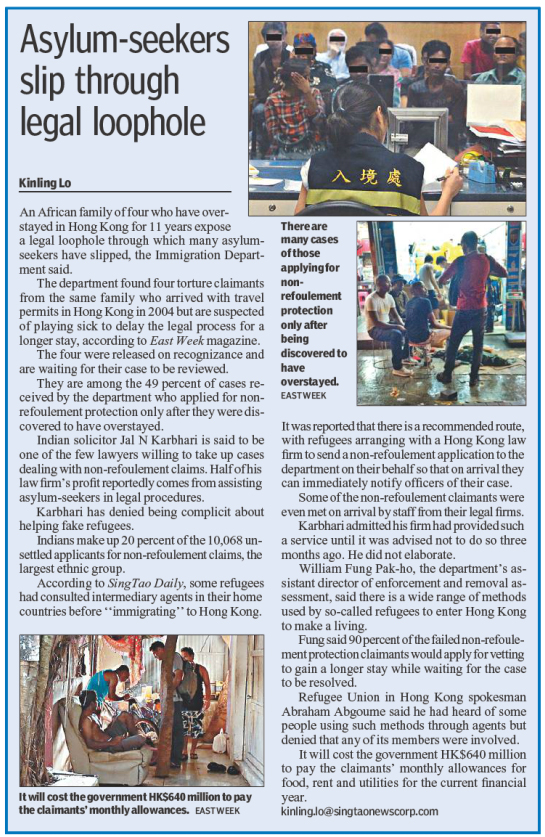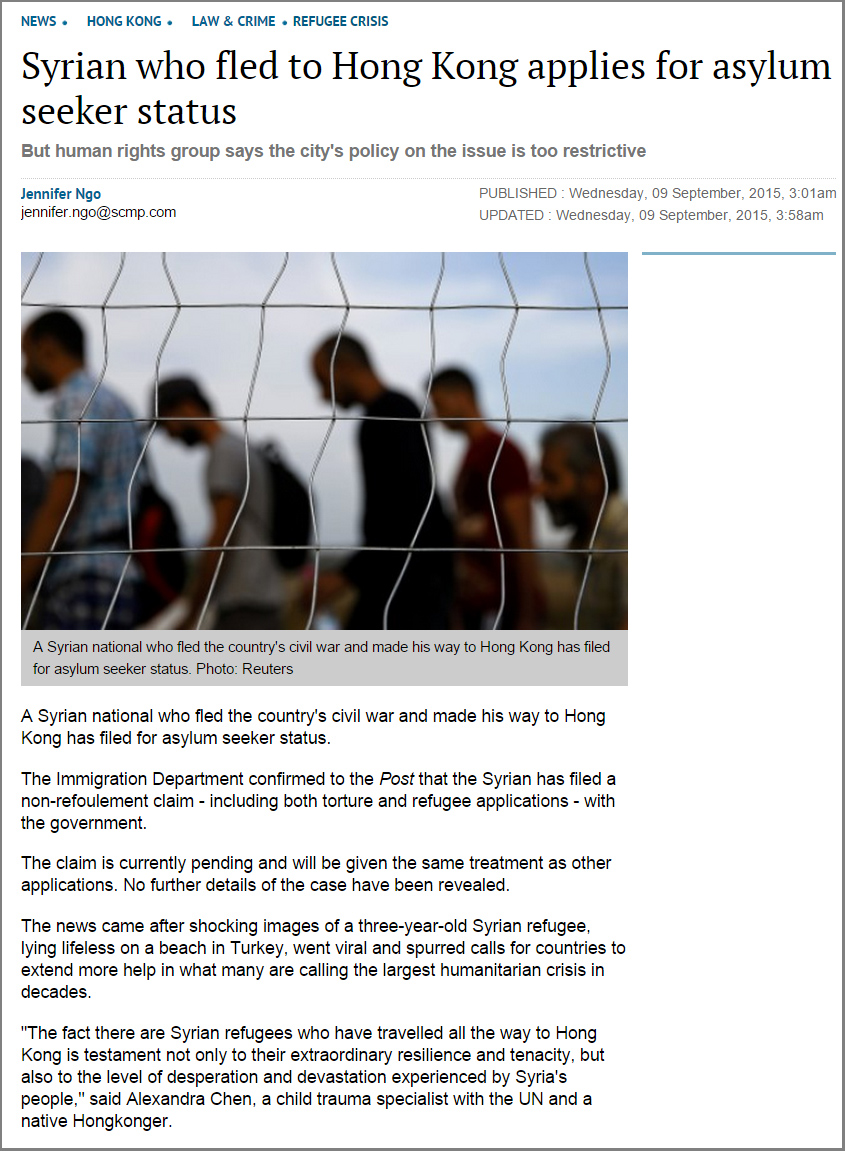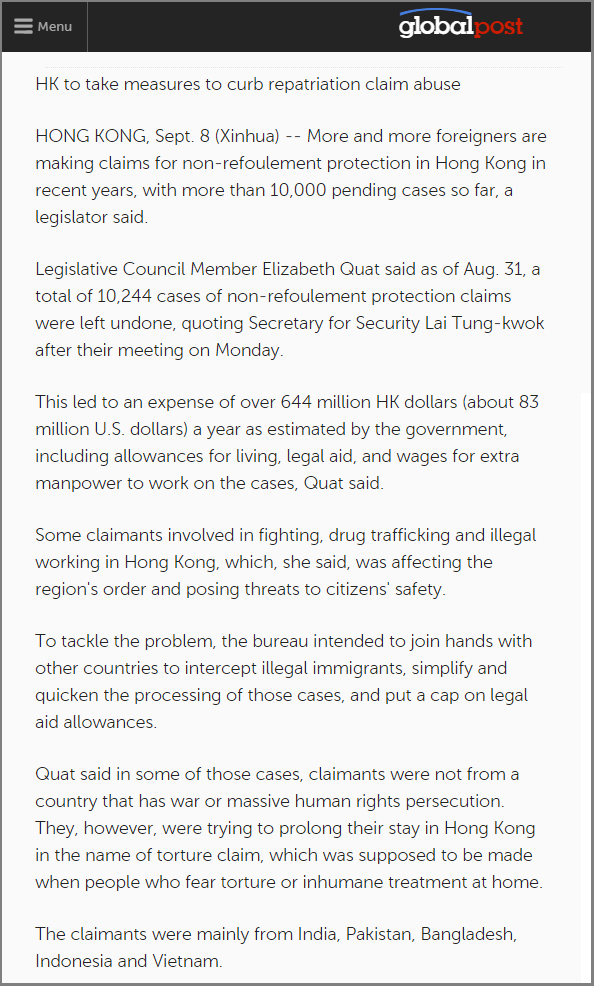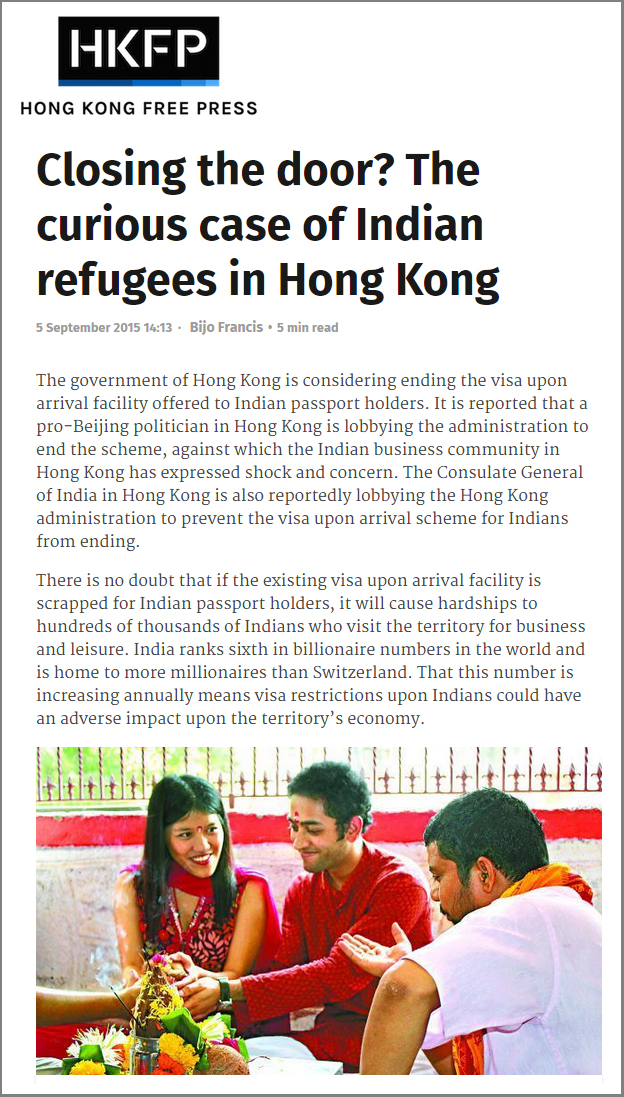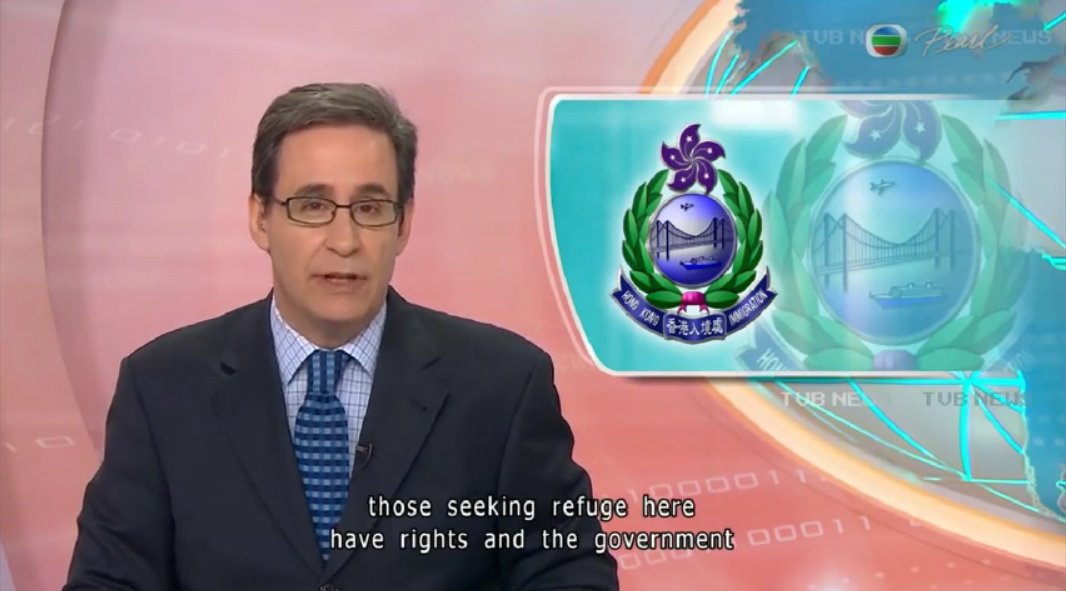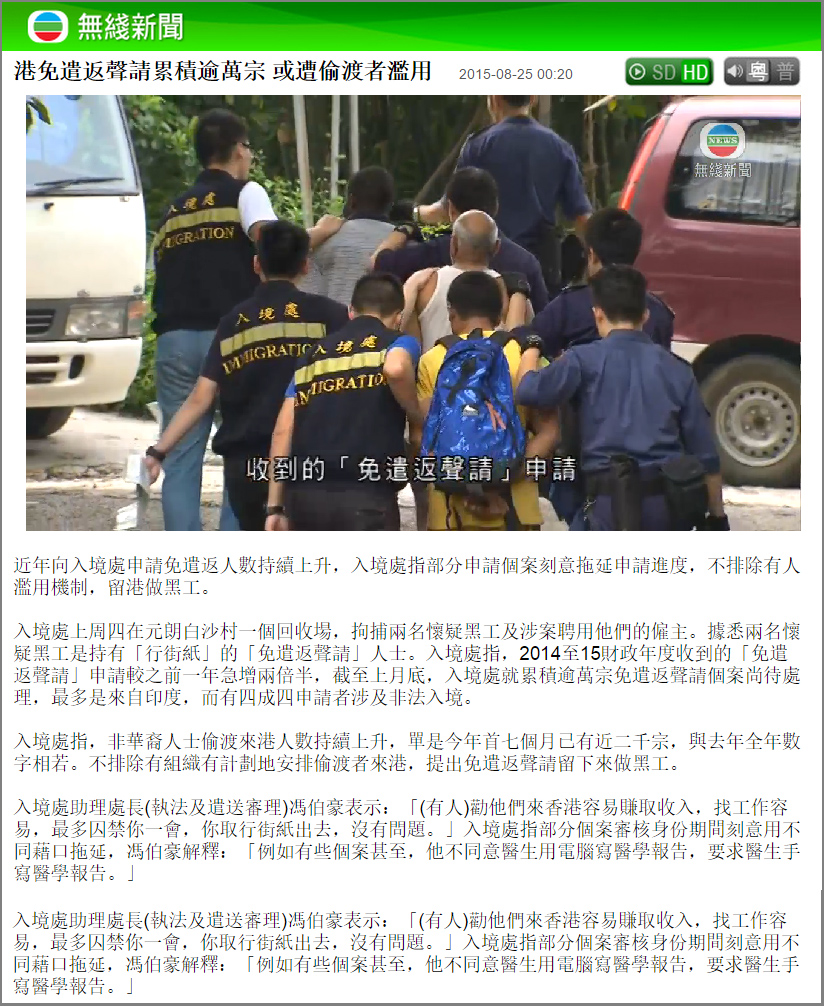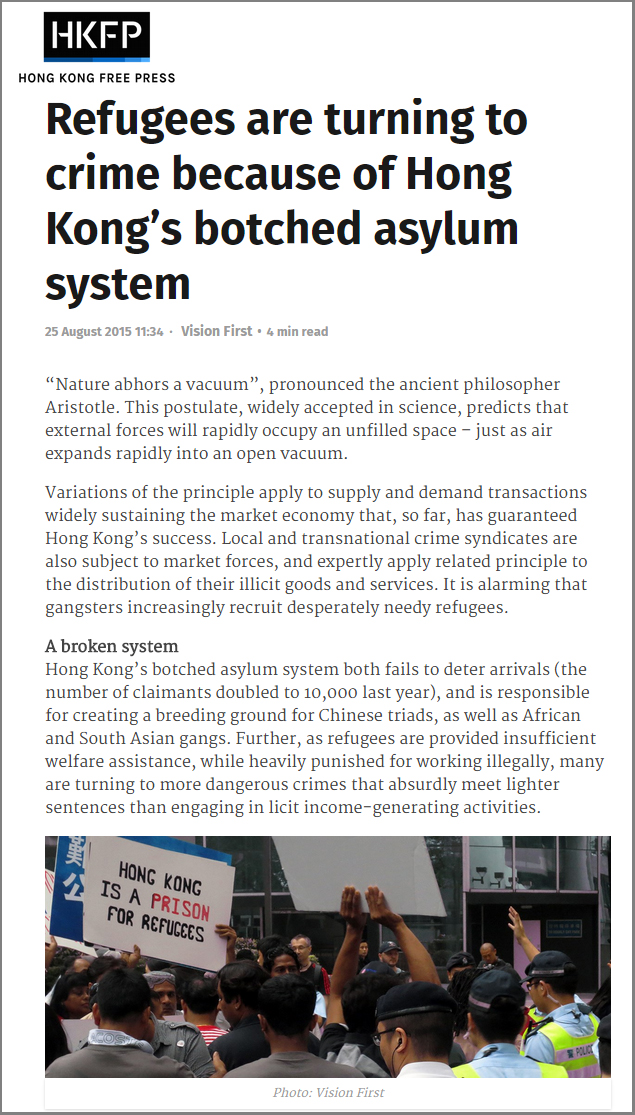Will Hong Kong’s negligent indifference to refugees shift?
Sep 9th, 2015 | Immigration, Rejection, VF Opinion | Comment
The summer of 2015 will be remembered for the unprecedented European refugee crisis that, at the cost of more than 3000 lives, galvanized public attention, prompted alleged policy changes and caused an apparent although inconsistent and perhaps short-lived shift from apathetic indifference. “There is an enormous response from the public,” said an aid-worker in Malta, “The tide of indifference is shifting.”
Faced with extraordinary challenges, some European leaders are offering support and money they should have pledged earlier. Although the effectiveness of such emergency expenditures remains to be seen, European heads of state appear to be cognizance of the moral imperative of doing what is needed irrespective of financial cost and socio-cultural ramifications.
Chancellor Angela Merkel pledged 10 billion euro over two years to settle a record 800,000 refugees representing a one percent population growth that will profoundly impact German society. She remarked, “The fundamental right to asylum does not have a limitation. As a strong, economically healthy country, we have the strength to do what is necessary and ensure that every asylum seeker gets a fair hearing.”
After criticizing rescue operations in the Mediterranean, Prime Minister David Cameron confirmed that the UK will receive 20,000 Syrian refugees over the next five years and pledged millions of pounds to assist frontline countries in the biggest, yet repeated, refugee crisis in decades. Speaking to the House of Commons he remarked, “In doing so, we will continue to show the world that this country is a country of extraordinary compassion.”
President Francois Hollande offered 11 million euro and stated that France will take 24,000 refugees over the next two years. He urged the European Union to make a collective effort to ensure that the European ideal of open borders would continue to be respected. Facing strong right-wing opposition, Hollande wants the French to accept a shift in policy regarding migrants.
Finnish Prime Minister Juha Sipila went a step further by offering his second home to a refugee family, as he no longer used it after moving to the capital. Meanwhile a German daily ran a popular article with advice on how to take in refugees, following the lead of lawmaker Martin Patzelt who hosted an Eritrean family. Patzelt wrote on Facebook, “I am trying to do my part … by giving a home to refugees and helping them to integrate into our country.”
Meanwhile Pope Francis invited every parish, convent and monastery across Europe to open their doors to homeless refugees who are “fleeing death from war and hunger and are on the path towards a hope for life.” He remarked, “Faced with a tragedy of tens of thousands of refugees, it is not enough to say ‘Have courage, hang in there.’” And the Vatican will welcome two refugee families.
Not without a hint of hypocrisy, riding the wave of public opinion distraught by photos of a dead toddler (hardly a unique occurrence), many European leaders have sprung into action. Citizens of Austria are sending convoys of private cars to assist refugees stranded at the Hungarian border. The first arrivals in Vienna were greeted with warm meals, blankets and shopping carts of food, water and hygiene products. Spaniards have gathered in street protests urging a better reception of refugees in Spain. A demonstration is planned this Saturday in London in solidarity for refugees.
In Hong Kong however refugee discourses hinge on securitization patterns. Death is a potent wake up call for the public. Does Hong Kong need to see some toddler dying in this city’s streets to finally question Hong Kong Government’s abysmal track record. Reports reach Vision First of asylum seekers engaging in the perilous journey to cross the sea between Hong Kong and China. Like Europeans a few days ago, these travelers are called migrants, or more precisely “illegal economic immigrants”. What will it take to shift for Hong Kong’s negligent indifference to refugees?
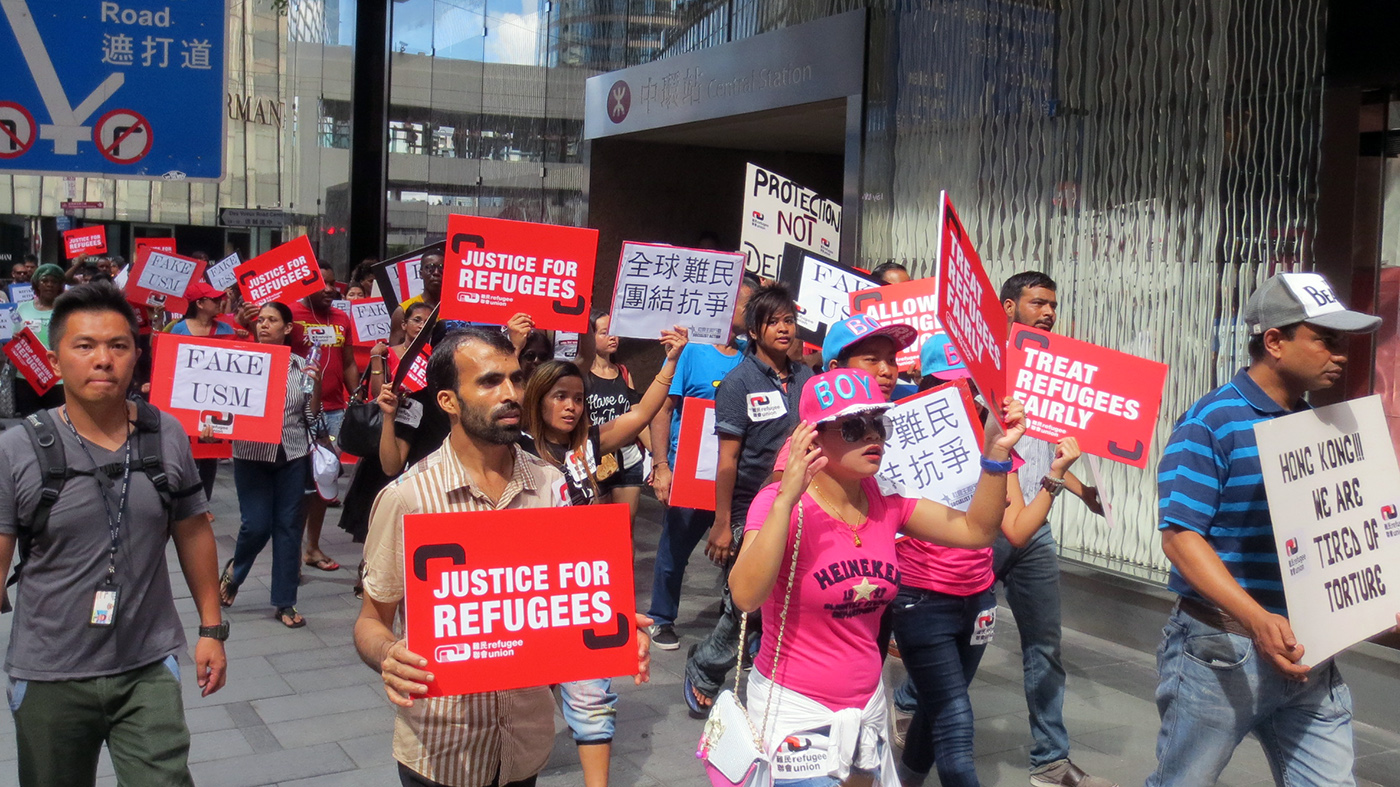
Asylum-seekers slip through legal loophole
Sep 9th, 2015 | Immigration, Media, Refugee Community, Rejection | Comment
Syrian who fled to Hong Kong applies for asylum seeker status
Sep 9th, 2015 | Immigration, Media | Comment
HK to take measures to curb repatriation claim abuse
Sep 9th, 2015 | Crime, Immigration, Media | Comment
Who allows wolves in sheep’s clothing to hide among refugees?
Sep 7th, 2015 | Crime, Immigration, Personal Experiences, Refugee Community, Welfare | Comment
Hello, I am Outsider reporting again on the experiences of refugees in Hong Kong.
Recently there have been many news reports about criminals who lodge Unified Screening Mechanism (USM) claims with the Immigration Department, but might not have legitimate grounds for protection. This is an issue which deserves to be discussed. It raises the question: Who allows wolves in sheep’s clothing to hide among refugees?
Immigration officials recently informed journalists that several hundred USM claimants broke the law: since the beginning of the year 113 claimants were arrested for working illegally and 515 were involved in other crimes, amounting to about 6% of 10,000 outstanding claimants.
Conveniently no explanation was provide about the different backgrounds of the so-called criminals with asylum claims who were arrested. At a risk of oversimplification, I believe there are three major groups: 1) destitute USM claimants who perform legal work without permission; 2) impoverished migrants and troubled traders who cannot renew/obtain visas; c) gangsters abusing asylum to avoid removal and engage in criminal activity.
For the first group, government press releases and news reports are biased and unbalanced as they failed to make relevant distinctions. It is suggested that many USM claimants are criminals and troublemakers, yet the unfair reporting lacks context. For instance, we refugees rent subdivided rooms costing $2500-3500 (the cheapest are windowless 2x4m cubicle with shared facilities), but receive just $1500 in rent assistance since February 2014.
For subsistence reasons, including keeping a roof over our heads, many refugees are obliged to work. Any refugee stuck in Hong Kong more than six months, has probably worked here and there. Of course few dare to admit it. We simply have no choice. The government is mocking readers by calling us ‘criminals’, which brings to mind dishonest individuals breaking the law for easy money.
The reality is refugees do hard work in construction and recycling for 10-12 hours a day in very dangerous conditions for a rip-off $200-300 without insurance or medical cover. That is neither desired nor easy money. We must work to pay for ours and our family’s daily needs, in particular for our children. Don’t let the government fool you, it is the failed asylum policy that forces refugees to work without permission.
For the second group, there are several nationalities who enter Hong Kong with visitor or work visas which eventually expire. Previously they would leave and return with another visa which was problematic, expensive and time consuming. After discovering that USM allows them to remain for years with some assistance, they stop leaving and returning. They are not to blame. They probably suffer unbearable poverty without social services in their country and, after discovering a benefit, naturally seize the opportunity.
For the third group, there are hardened gangsters who resist deportation by lodging USM claims to avoid removal/detention and persist in their criminal ways. A few characters frankly explained to me that this was the only exploit to remain in Hong Kong. These abusers are thumbing their noses at a system that allows them to stay unchallenged for years. Their pockets lined with the real easy money, they entice dispossessed refugees to join their gangs.
Entering Hong Kong just to be an asylum seeker is not attractive. In fact, asylum seekers face years of intolerable hardship. Instead abusers and criminals are attracted by a failed asylum system that remains open to and indeed welcomes exploitation. These individuals find an open and unguarded environment in which they can achieve goals not related to asylum.
It appears that the government is deceptively singling out a minority 6% of arrested refugees to criminalize and degrade the law-abiding majority. A careful review of recent news reports suggest that the Government is blaming everyone – refugees, smugglers, lawyers and interpreters – without considering its responsibility towards a policy that fails refugees. The USM appears not to benefit society (tax-burden and security risk), while it allows the government to maintain an established policy of not granting asylum.
Dear readers, if the USM processed asylum claims credibly and fairly within 6 months rather than the claimed average of 2-3 years (more like 5-10), would it be approved by refugees? Would it benefit society? Would it limit the cost and social risk? Would it continue to harbour wolves in sheep’s clothing?

Closing the door? The curious case of Indian refugees in Hong Kong
Sep 5th, 2015 | Immigration, Media | Comment
All they want to do is reject people
Sep 1st, 2015 | Immigration, Personal Experiences, Rejection, VF Opinion | Comment
“There is no chance for you to make an appeal. You should give up”, an African refugee reported being told by his duty lawyer a few weeks before withdrawing his asylum claim. According to the Standard, on top of 2237 rejected cases, 1600 claimants cancelled their asylum bid since the Unified Screening Mechanism (USM) was launched in March 2014.
Although the number of new arrivals is surging, rejection and withdrawal figures suggest that Hong Kong Government is waging a psychological war that underpins a “long established policy of not granting asylum” (Security Bureau, § 6).
The absurdity of seeking asylum in Hong Kong was a painful experience for Marku (not his real name). Without questioning his credibility, Immigration rejected his claim with the assessment that he could relocate or hide internally in his country.
Concealment in remote areas (including spider holes?) might indeed be an option for individuals fleeing persecution. However, in our experience, Immigration appears to unimaginatively and unconvincingly suggest “internal flight” and “internal relocation” as the only viable alternative when dismissing otherwise credible asylum applications.
“My lawyer said that I should go back to my country and live someplace else,” Marku reported with frustration. “He advised me not to appeal despite hearing that my country was at war and my problem is very big. He said, ‘Your immigration officer was right. He made the right decision to reject your claim.’” Marku was incredulous and had the impression that, “My lawyer just came to help Immigration to reject me!”
Marku continued, “The lawyer didn’t provide even one (COI) document that I saw. Everything I did myself. I didn’t hear him give me any advice, or suggest anything during the interviews. It was like he was not my lawyer. It was like he was one of the officers of Immigration. He did not care about me. He did not care about my case, about anything.”
States erect policy walls inside borders to discourage and deter refugees. These barriers are less sinister, yet arguably more harmful, than border fences. As Marku experienced, such impediments obstruct the course of asylum and the securing of protection, “I have proof. I have everything. I have death certificates (of family members), but they don’t care. I decided to go back because Hong Kong Government is not serious.”
Refugees bounce from interview to interview for years till 99.7% are either rejected or withdraw their claims in frustration. The trend is less indicative of abuse, than a challenge to the credibility of an ill-conceived and poorly implemented asylum system. On the flip side, in light of the “long established policy of not granting asylum”, the screen-to-reject process might be considered a resounding success.
Hong Kong’s culture of rejection hit Marku hard, “I am very disappointed. I am just wasting my time in Hong Kong for nothing. I have (many) family members who fled to (a neighbouring country) and were all recognized by the UNHCR because of my personal problems, not because of something that happened to them. I told Immigration and still they rejected my claim.”
Marku, who was allowed by Immigration to fly to a neighbouring African country, was utterly disillusioned, “All they want to do is to reject people. There is no justice in Immigration for asylum seekers and refugees. I stopped in Hong Kong for protection, because if I went home they would kill me. But now I know they don’t give protection. Now I know the USM is fake. Why should I stay? After I closed my case, Immigration wrote, ‘Your appeal and petition are dismissed on the ground that your contemplated risks are no longer in existence.’”
Is that intended to rub salt in the wound?
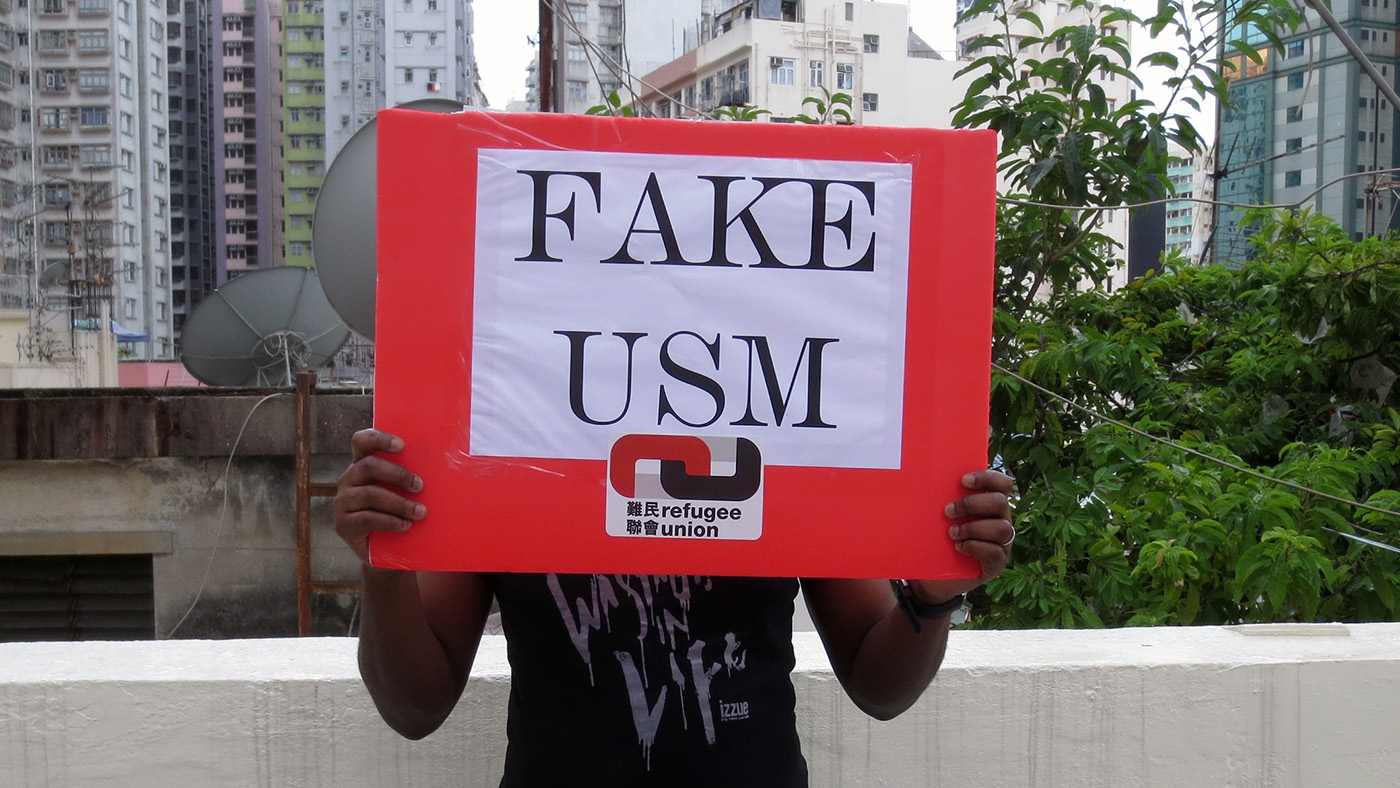
TVB – People seeking refuge in Hong Kong have rights
Aug 25th, 2015 | Crime, Immigration, Media, Rejection | Comment
Refugees are turning to crime because of Hong Kong’s botched asylum system
Aug 25th, 2015 | Crime, Immigration, Rejection, VF Opinion, Welfare | Comment


